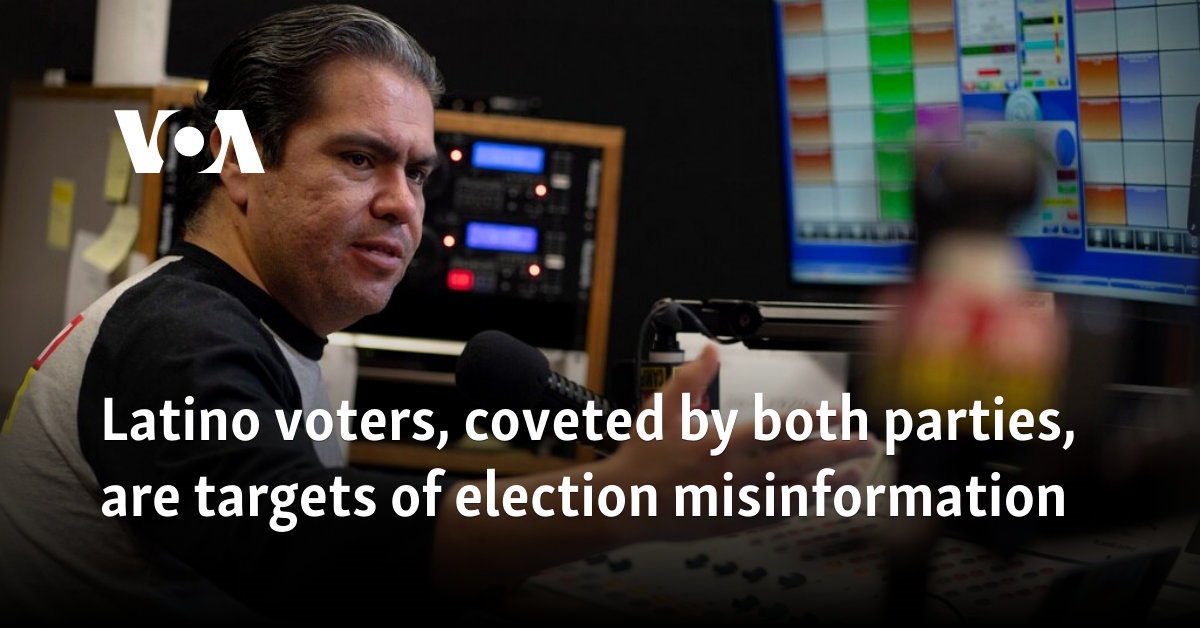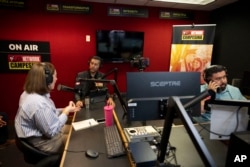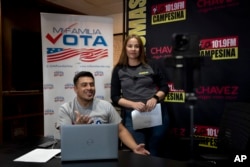As Ranchera music filled the studio of Radio Campesina in Phoenix, a radio personality spoke into the microphone in Spanish.
“Farmers, truth and unity are more important than ever in these elections,” morning show host Tony Arias said. “Don’t let yourself be trapped by false information.”
The audio was recorded as a promotional video for Radio Campesina’s new campaign aimed at empowering Latino voters ahead of the 2024 elections. This work includes discussing election-related misinformation narratives and fact-checking on-air conspiracy theories.
“We are on the front lines of fighting disinformation in our communities,” said Maria Barquin, program director at Chavez Radio Group, a nonprofit that operates Radio Campesina, a Spanish-language radio network in Arizona, California and Nevada.
“There are many risks to our communities in 2024. So we need to step up our efforts now more than ever.”
Since the last presidential election, the Latino population has grown at the second-fastest rate among all major racial or ethnic groups in the United States, behind only Asian Americans, and is projected to make up 14.7 percent, according to a Pew Research Center analysis. 36.2 million people. The share of all eligible voters reached a new high in November. They make up a growing share of the electorate in several presidential and congressional battleground states, including Arizona, California and Nevada, and are heavily pursued by Republicans and Democrats alike.
Democratic President Joe Biden sees Latino voters as a key reason he defeated Republican Donald Trump in 2020 and is urging them to help him do it again in November. With the stakes high in a presidential election year, experts expect there will be a surge in misinformation targeting Spanish-speaking voters, especially through audio and video.
In addition to radio, most of the news and information Latinos consume comes in audio form through podcasts or social media platforms such as Facebook, WhatsApp and YouTube. Moderation of Spanish-language content on these platforms has been limited, and a growing number of right-wing influencers are peddling election lies and QAnon conspiracy theories.
The types of misinformation overlap with lies found in other conservative media outlets and in many corners of the internet — conspiracy theories about mail voting, dead-man voting, rigged voting machines and polling place threats.
Other narratives are closer to the Latino community, including disinformation about immigration, inflation, and abortion rights, often tapping into the trauma and fears of specific communities. For example, Spanish speakers from countries with a recent history of authoritarianism, socialism, high inflation, and electoral fraud may be more susceptible to misinformation about these topics.
Compared with more traditional text-based misinformation, Daiquiri Ryan Mercado, strategic counsel and policy advisor for the National Hispanic Media Coalition, which manages the Spanish-language disinformation coalition, said Misinformation on the airwaves is also particularly difficult to track and combat. While misinformation researchers can more easily write programs to classify and track text-based misinformation, audio often requires manual listening. Radio stations that only play in a certain area at certain times can also be difficult to track.
“When we have such limited representation, Spanish speakers feel like they can connect with these people and be trusted messengers,” Mercado said. “But some people may take advantage of that trust.”
Mercado and others say that’s why trusted messengers like Rural Radio are so important. The station was founded by Mexican-American labor and civil rights leader Cesar Chavez and built a loyal listening base over decades. Baquin said that at any given moment, as many as 750,000 people are listening to the Chavez Broadcasting Network on the radio and online.
“They come to hear us because of the music, but our main focus is to empower and educate through information,” she said. “Music is just a tactic to get them in.”
Radio Campesina’s on-air talent and musical guests frequently discuss misinformation on air, answer listeners’ questions about voting, teach them how to identify misinformation and provide tutorials on the election process, such as how to submit a mail-in ballot. The station also hosts rodeos and music events to register new voters and discuss misinformation.
They allow listeners to call or text questions on WhatsApp. WhatsApp is a social media platform particularly popular with immigrant communities, but many of the misinformation they see spread on the platform. In March, the station partnered with Latino advocacy group Mi Familia Vota to host a live show and voter phone bank to answer voters’ questions.
“We know that there are a lot of people who are unmotivated because sometimes we come from countries where, when it comes to elections, we don’t believe in voting,” said Carolina Rodriguez-Greer, Mi Familia Vota Arizona director ) said before sharing. Information on how voters can track their ballots.
Rodriguez-Grier said the group began working with Hispanic media to dispel misinformation after seeing candidates like former Arizona gubernatorial candidate Kari Lake spread lies about the 2022 election. Lake is currently running for U.S. Senate with the support of Trump.
“One way to combat this misinformation is to provide airlines with correct information,” said Angelica Razo, Mi Familia Vota’s deputy national campaign and programs director.
Various other community and media groups are also prioritizing the seemingly never-ending battle against disinformation.
Maritza Felix often checks out misinformation for her mother, whom she calls the “Queen of WhatsApp.” This led Felix to do the same thing for family and friends in a WhatsApp group that later grew into the Hispanic journalism nonprofit Conecta Arizona.
It now runs a radio show and newsletter debunking false claims about the electoral process, health, immigration and border politics. Conecta Arizona is also combating misinformation about the upcoming Mexican presidential election, which Felix said has seeped across the border.
Spanish-language fact-checking organization Factchequeado is partnering with dozens of media organizations across the country to provide training and free Spanish-language fact-checking content.
Laura Zommer, co-founder of Factchequeado, said: “Disinformation is both a global phenomenon and a hyper-local phenomenon. Therefore, we must join forces with local and national groups to solve this problem.”
Follow us on Google news ,Twitter , and Join Whatsapp Group of thelocalreport.in















